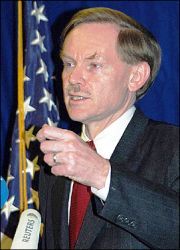US urges greater NATO role in Sudan, Russia offers troops
Feb 5, 2006 (MUNICH, Germany) — The United States urged NATO on Sunday to play a bigger rule helping peacekeeping efforts in Sudan’s conflict-wracked Darfur region and Russia offered to send 200 troops for a U.N. mission there.
 U.S. Deputy Secretary of State Robert Zoellick said NATO could offer more logistics, intelligence, and planning assistance to the current African Union peacekeeping mission in Darfur, including the deployment of a small number of experts on the ground.
U.S. Deputy Secretary of State Robert Zoellick said NATO could offer more logistics, intelligence, and planning assistance to the current African Union peacekeeping mission in Darfur, including the deployment of a small number of experts on the ground.
He told an international security conference the United States would try to speed up the takeover of the peacekeeping mission by the United Nations, which was approved by the Security Council on Friday. U.N. officials have said it could take a year for the world body to take over the mission.
Russian Defense Minister Sergei Ivanov said Russia was willing to send 200 peacekeepers and a helicopter strike force to Darfur as part of a U.N. mission.
The Security Council unanimously authorized the U.N. to start planning for the takeover of the 7,000-strong AU peacekeeping force which has failed to stop violence in the region which is estimated to have killed 180,000 people, most from hunger and disease.
Sudan’s government denies charges it has unleashed Arab tribal militias against civilians in response to a local uprising.
Zoellick said NATO assistance was needed while the U.N. prepares its force. NATO has helped to fly the African peacekeepers into Darfur and provided some logistical support and training.
However, France in particular has expressed concerns about a wider NATO role, suggesting the European Union could be better placed for an African operation. Zoellick held talks with French officials on Darfur in Paris before traveling to Munich.
“I just hope people don’t get theological about this,” Zoellick told the conference, in an apparent reference to French concerns. “I hope that capitals that sometimes get a little complex on these issues don’t on this.”
Jan Pronk, the top U.N. official in Sudan, told the German newspaper Frankfurter Allgemeine Zeitung recently that he expected a U.N. force to be embarked in Darfur by early 2007. He has said four years and a 20,000-strong force will be needed.
The U.N.’s Under-Secretary-General for Peacekeeping Jean-Marie Guehenno last month said NATO and EU nations were best placed to provide the military muscle needed for that mission.
“A force in Darfur has to be robust, mobile,” he told reporters in Brussels after meeting officials from the two organizations. “When we talk about firepower there are capacities that exist more in the member states of NATO and the European Union than in the rest of the world.”
(ST/AP)
